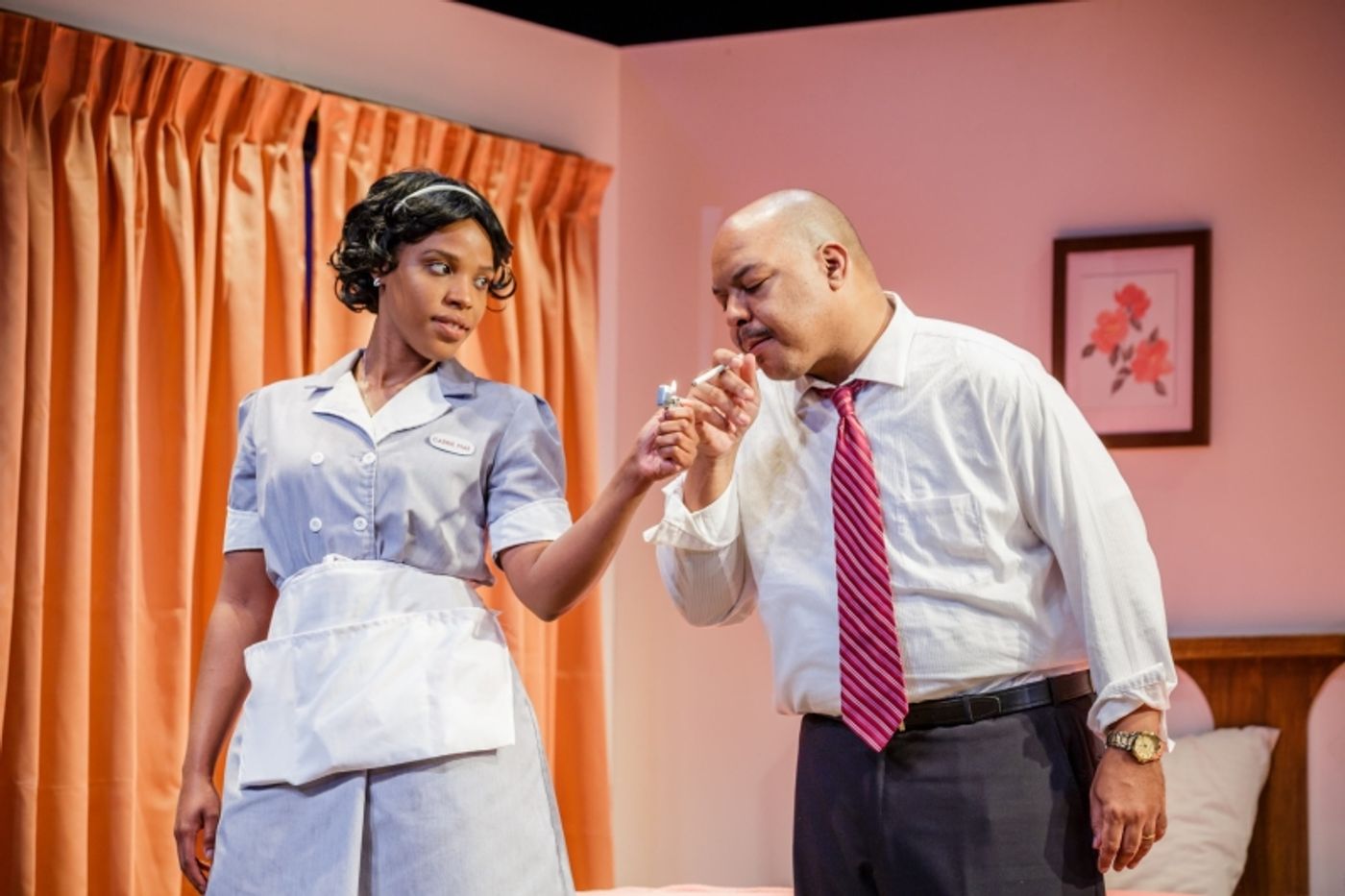Review: Audacious and Inspiring, Garden Theatre's THE MOUNTAINTOP Puts Us in a Room with Martin Luther King Jr.
Profoundly written, acted, and staged, The Garden's one-act production finds the everyman in an icon...

On a rainy, snowy night in 1968, Dr. Martin Luther King Jr. retires to his room on the second story of a modest motel in Memphis. Local sanitation workers are on a civil rights strike and abroad, the Vietnam War falls further into fiasco. White supremacists stalk his every move. In spite of the danger, King has just given one of his more celebrated speeches, the one we now know as I've Been to the Mountaintop. It will be his last. He will never leave that motel. His final hours will be spent in sly rapport with a saucy, daring motel worker named Carrie Mae, or "Camae" for short.
Okay, so maybe that conversation with Camae never happened. But in THE MOUNTAINTOP, it does. And Camae - a spirited, sensual, world-wise young woman with a weary view of the movement - becomes a clever device for playwright Katori Hall to imagine what Dr. King's last night on earth might have been like. Where was his mind at? Which of his fears were foremost in his mind? In his heart of hearts, did he still harbor hope for America? Did he sense that he might soon die?
THE MOUNTAINTOP is a daring and compelling piece of theatre, powerfully staged this month at The Garden Theatre in downtown Winter Garden, FL. It wastes no time in restoring King from the marble statues and speckled newsreels of history to beating heart and flesh and blood.
Fifteen minutes into the one and only act, this beloved and legendary minister is already puffing on cigarettes, swilling whiskey, and coming dangerously close to an affair.
None of that is entirely outside the historical record. The FBI used allegations of adultery to smear King at his peak, and at least one eyewitness claimed to see a young woman leaving the reverend's hotel room that fateful morning.
Ultimately, whether any of it amounted to something improper is as speculative as it is irrelevant. But Hall's willingness to go there, and to do it right out of the gate, gives this play its power. It makes a man out of Martin - Michael, even (King's real name).
Essex O'Brien is a fully realized MLK. He fumbles about the room. He mutters to himself. He charmingly recoils at a whiff of his own feet. He laughs loudly at little things. He's everything that Martin Luther King might have been in a hotel room all by himself. And when the moment calls for it, he's everything else Martin Luther King was too: stately, dignified, rousing, and wise. His King is reverent but relatable... pious but imperfect... courageous but terrified... a statesman and a flirt all in one. Even if Hall's disarmingly humanizing text does much of the legwork, without O'Brien's dynamism and authenticity, the reverend wouldn't seem so remarkably real.
In walk and talk, Anita Whitney Bennett credibly inhabits the part of a sharp-witted and mysterious 1960s hotel worker. But it's what she does with her face and especially her eyes that really electrifies Camae's act-long joust with Dr. King. There's a knowing, a prying, and an unsettling sense of the off-limits and the unsaid in that eye work. Her arrival creates an immediate atmosphere of tension and even danger. The audience can't get a grip on what Camae is doing here - not until Hall shakes things up in powerful fashion - but Bennett has us wanting to figure it out. Her chemistry with O'Brien makes their every flirt and quarrel crackle.
Adding to that disquiet is Tramaine Berryhill's set design, a modest hotel room haunted by the unrelenting visage of the Lorraine Motel sign just above it - an omen in neon. So too does sound designer Anthony Narciso's choice to keep the actors' voices unamplified, effectively bringing us into that intimate hotel room. Halfway back in the auditorium, discerning dialogue was almost never an issue, even over Narciso's subtle but unrelenting rainfall, itself an instrument of foreboding.
Tickets to THE MOUNTAINTOP come with a "Note on Theatre Etiquette and Belonging" from director Felichia Chivaughn, welcoming any and all respectful displays of emotion in the audience. It's a heartfelt gesture (and not for nothing, a clever piece of marketing), but it's also a glimpse of the stirring heights this show will reach by its end, when King's mission and humanity are linked intensely to our own. She invites sighs, moans, and amens. On opening weekend, I heard them all. It's unlikely you'll emerge without feeling strong emotions of your own.
THE MOUNTAINTOP runs through February 6, 2022. Patrons are strictly required to wear face coverings, while the actors perform unmasked. (The Garden does not specify whether cast and crew are vaccinated or undergo Covid testing.) This is the first pandemic-era show at The Garden to return to 100% seating capacity, sans social distancing. Concession sales remain suspended, as are paper programs, unfortunately. Digital programs remain available via QR code or at https://www.gardentheatre.org/.

What did you think of THE MOUNTAINTOP at Garden Theatre? Let me know on Twitter: @aaronwallace
Photos by Steven Miller Photography, courtesy of Garden Theatre
Reader Reviews
Videos

